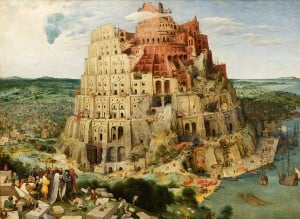In the 1970s, while browsing in a Harvard Square bookstore, I found a thin volume with the intriguing title Guide for the Perplexed, a title similar to the title of the famous text of the medieval Jewish Philosopher Moses Maimonides. The volume was selling for one dollar. Its author, E. Fritz Schumacher,

was familiar to me. I first heard of him a decade earlier, a middle aged economist, Austrian born and educated, a member of the British Coal Board, and a counter cultural hero to many young people because of his book Small is Beautiful: Economics as if People Mattered, a book that was not given serious or sustained attention at the time by most professional economists. Nevertheless, given its low price, its intriguing title, and Schumacher’s notoriety, I bought Guide for the Perplexed.
In Guide for the Perplexed Schumacher reflected on his education. He concluded it focused on ways of obtaining very exact and precise answers to questions that he now had begun to think of as often quite trivial, but this education had contributed little or nothing to his ability to obtain a grasp of the truth in response to what he now realized were fundamental and important questions. He shifted his focus. He decided it was more important to obtain at least slender truth in answer to fundamental questions about life’s meaning, and what he should do live his life in the best possible way. His reflection led him to the moral philosophy of Aristotle, and Guide for the Perplexed is a primer on how to use that philosophy to gain at least a slender grasp of the truth in answer to what are really fundamental questions. Schumacher concluded that although he had an excellent technical education, it was an education that was deficient in a fundamental way.
The distinction between the rational man of Aristotle and the rational actor of modern economics was brought home to me dramatically in the 1980s when I began to teach in the Perspective on Western Civilization program at Boston College. Among the texts I taught was Edmund Burke’s Reflections on the Revolution in France. My theologian colleague Fred Lawrence described Burke’s text as the swan song of practical reason. What this meant became clear when I read what Burke wrote concerning the actions of what he called “a band of cruel ruffians and assassins reeking with blood” who “rushed into the chamber of the queen” forcing her to flee for her life. Burke refers to this in the following words
It is now sixteen or seventeen years since I saw the queen of France, then the dauphiness, at Versailles, and surely never lighted on this orb… a more delightful vision. … little did I dream that I should have lived to see such disasters fall upon her in a nation of gallant men, in a nation of honor and cavaliers. I thought ten thousand swords must have leaped from their scabbards to avenge even a look that threatened her with insult. But the age of chivalry is gone. That of sophisters, economists, and calculators has succeeded and the glory of Europe is extinguished forever.
Burke’s reference to economists brought me up short. In this passage he pictures the economist as a man who uses his reason to calculate the costs and benefits of going to the aid of the queen, and finding the benefit cost ratio unfavorable decides that going to the aid of the queen is not rational, and that the queen should look after herself. The rational actor is thus revealed by Burke as simply a good calculator of what is in his own narrow interest. Reason in this sense is simply the ability to calculate.
In the discussions with my colleagues that led to the development of the course in which Burke’s Reflections was one text Father Joe Flanagan expressed the opinion that a key concept in organizing the course should be Aristotle’s concept of phronesis, the Greek word for practical wisdom, which is the intellectual virtue needed to use our practical reason well, to be able to make good judgments in making our moral choices, judgments consistent with living in the way most likely to lead us to happiness, the end that is implicit in our nature as rational social beings. The rational man from this perspective is not concerned simply with calculating how to best achieve the object of his passions, whatever it might be, but is focused instead on making decisions most likely lead him to achieve his telos, the end of his nature, and for the person of faith, the telos is the Beatific Vision. The calculating reason intrinsic to economics as a social science is relevant to human action, but in the well ordered person it is subordinate to prudential practical reason that leads him to reach the right answers to the fundamental questions Schumacher alluded to when he referred to slender truth obtained by reason in answer to questions about what one should do to live his life in the best possible way. Thus, there is an important difference between the rational man of Aristotle and the rational actor of modern economic theory.
 Francis M. McLaughlin is Associate Professor Emeritus of Economics at Boston College.
Francis M. McLaughlin is Associate Professor Emeritus of Economics at Boston College.











